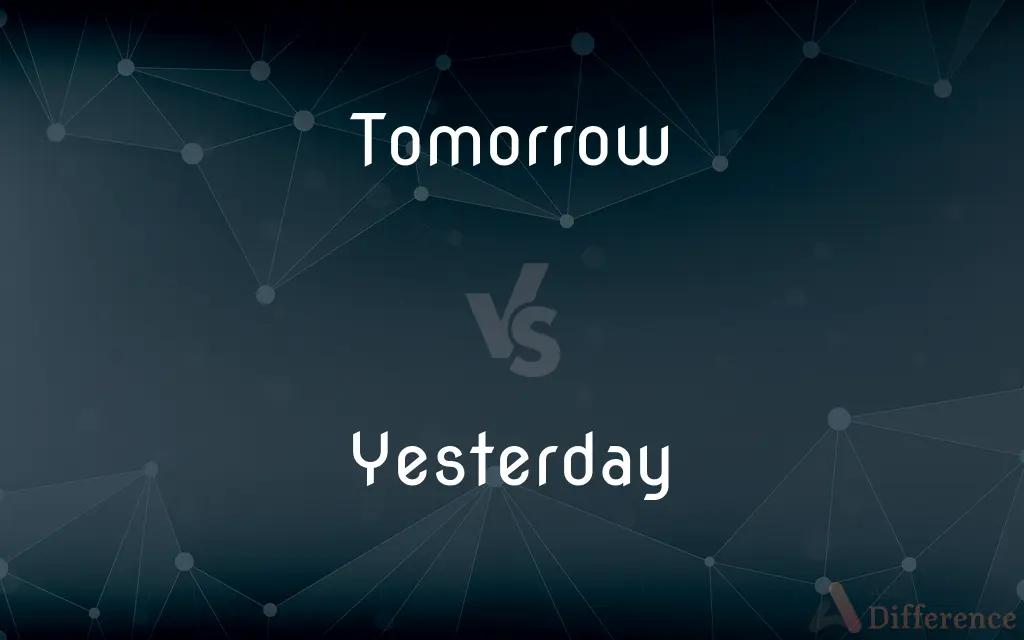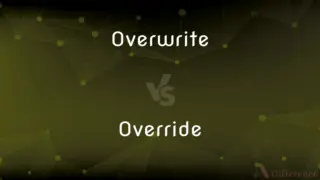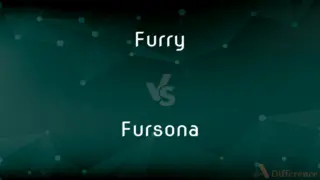Tomorrow vs. Yesterday — What's the Difference?
By Tayyaba Rehman — Updated on October 5, 2023
"Tomorrow" refers to the day after today, whereas "Yesterday" denotes the day before today, reflecting a straightforward contrast in temporal context.

Difference Between Tomorrow and Yesterday
Table of Contents
ADVERTISEMENT
Key Differences
Tomorrow" and "yesterday" directly contrast in their reference to future and past days respectively. "Tomorrow" anticipates a time that is immediately next in the linear progression of days, while "yesterday" refers to the immediate past day, demonstrating straightforward opposition in temporal context.
The concept of "tomorrow" is intrinsically linked with future events, expectations, or promises, often embodying hope or anticipation. Conversely, "yesterday" tends to evoke reflection, nostalgia, or analysis, often encapsulating memories or past experiences, thereby differentiating their emotional or psychological connotations.
In the realm of planning and scheduling, "tomorrow" becomes a crucial term, often utilized to arrange future actions or events. "Yesterday," while not employed for planning, is vital for discussing past events, mistakes, or achievements, elucidating diverse functionalities in communication.
In literature and idiomatic expressions, "tomorrow" is frequently a symbol of hope, opportunity, or forthcoming changes, suggesting prospective developments or promises. Contrarily, "yesterday" might be utilized to muse about bygone times, regrets, or historical contexts, providing depth and history to narratives.
"Tomorrow" can sometimes be an ambiguous or indefinite term when used metaphorically to imply an undetermined future time. "Yesterday," while also used metaphorically at times, tends to firmly root narratives or discussions in the past, thus affirming their distinct implications in various contexts.
ADVERTISEMENT
Comparison Chart
Temporal Reference
Future day.
Past day.
Common Associations
Anticipation and planning.
Reflection and memories.
Use in Planning
Extensively used.
Not used.
Symbolic Meaning
Often signifies hope or prospects.
Indicates past or bygone times.
Metaphorical Usage
Can denote an unspecified future.
Typically points to a specific past.
Compare with Definitions
Tomorrow
In the near future.
Things will be better tomorrow.
Yesterday
A term reflecting past times.
I have moved on from the yesterdays.
Tomorrow
A timeframe for postponed actions.
We'll try again tomorrow.
Yesterday
An idiom for old, outdated concepts.
Those ideas are from yesterday.
Tomorrow
Indicative of future consequences.
Our choices today shape our tomorrow.
Yesterday
Indicating a past period.
He left yesterday evening.
Tomorrow
On the day after today
The show opens tomorrow
Yesterday
The day before today.
It rained yesterday.
Tomorrow
The day after today
Tomorrow is going to be a special day
Yesterday
On the day before today
He returned to a hero's welcome yesterday
Tomorrow
The day following today.
Yesterday
The day before today
Yesterday was Tuesday
Tomorrow
The future.
Yesterday
The day before the present day.
Tomorrow
On or for the day following today
"I won't think of it now.... I'll think of it tomorrow" (Margaret Mitchell).
Yesterday
Also yesterdays Time in the past, especially the recent past.
Tomorrow
On the day after the present day.
Yesterday
On the day before the present day.
Tomorrow
At some point in the future; later on
If you don’t get your life on track today, you’re going to be very sorry tomorrow.
Yesterday
A short while ago.
Tomorrow
On next (period of time other than a day, such as a week or a month), following the present (period of time).
Yesterday
The day immediately before today; one day ago.
Today is the child of yesterday and the parent of tomorrow.
Yesterday was rainy, but by this morning it had begun to snow.
Tomorrow
(obsolete) On the next day (following some date in the past).
Yesterday
(figuratively) The past, often in terms of being outdated.
Yesterday's technology
The worker of today is different from that of yesterday.
Tomorrow
The day after the present day.
Tomorrow will be sunny.
Yesterday
On the day before today.
I started to watch the video yesterday, but could only finish it this evening.
Tomorrow
On the day after the present day; on the next day; on the morrow.
Summon him to-morrow to the Tower.
Yesterday
(informal) As soon as possible.
I want this done yesterday!
Tomorrow
The day after the present; the morrow.
One today is worth two to-morrows.
Yesterday
The day last past; the day next before the present.
All our yesterdays have lighted foolsThe way to dusty death.
We are but of yesterday, and know nothing.
Tomorrow
The day after today;
What are our tasks for tomorrow?
Yesterday
Fig.: A recent time; time not long past.
The proudest royal houses are but of yesterday, when compared with the line of supreme pontiffs.
Tomorrow
The near future;
Tomorrow's world
Everyone hopes for a better tomorrow
Yesterday
On the day last past; on the day preceding to-day; as, the affair took place yesterday.
Tomorrow
The next day, the day after, following the present day
Yesterday
The day immediately before today;
It was in yesterday's newspapers
Tomorrow
A metaphor for future opportunities.
Tomorrow holds great promise.
Yesterday
The recent past;
Yesterday's solutions are not good enough
We shared many yesterdays
Yesterday
On the day preceding today;
Yesterday the weather was beautiful
Yesterday
In the recent past; only a short time ago;
I was not born yesterday!
Yesterday
In the recent past.
I saw him yesterday.
Common Curiosities
Can "tomorrow" be used metaphorically?
Yes, it can symbolize future opportunities or times.
Can "yesterday" embody regret or nostalgia?
Yes, it is often used to muse about the past.
How does “the day after tomorrow” enhance the meaning of "tomorrow"?
It specifies a time two days into the future, further than "tomorrow."
Do "tomorrow" and "yesterday" refer to exact timeframes?
Yes, "tomorrow" is the next day, and "yesterday" is the previous day.
Can "tomorrow" imply indefiniteness?
Sometimes, as in "tomorrow never comes," meaning delay or procrastination.
Is it grammatically correct to say "on tomorrow"?
Typically no; simply say "tomorrow."
Does "yesterday" indicate a specific time of the day?
No, it refers to the entire day before today without specifying the time.
Can "tomorrow" be used to express skepticism about change?
Yes, e.g., in phrases like "Tomorrow, and tomorrow, and tomorrow," signifying endless delay.
Can "yesterday" refer to an extended past period?
Sometimes, especially in expressions like "those were the yesterdays."
Is "yesterday" used to discuss future events?
No, "yesterday" specifically refers to the past.
Does "tomorrow" always infer positivity?
Not always. It may also convey procrastination or unspecified delays.
Is "yesterday" always used literally?
No, it can be metaphorical, e.g., to express a time that feels distant.
Can "tomorrow" be utilized to symbolize eternal hope?
Yes, it's often used to represent perpetual or upcoming opportunities and hopes.
Can "yesterday" be used to infer irrelevance?
Yes, in contexts like "That's so yesterday," implying it’s outdated or irrelevant.
How does “yesterday morning” differ from “last morning”?
“Yesterday morning” is correct for indicating the morning of the day before today; “last morning” is not standard usage.
Share Your Discovery

Previous Comparison
Overwrite vs. Override
Next Comparison
Furry vs. FursonaAuthor Spotlight
Written by
Tayyaba RehmanTayyaba Rehman is a distinguished writer, currently serving as a primary contributor to askdifference.com. As a researcher in semantics and etymology, Tayyaba's passion for the complexity of languages and their distinctions has found a perfect home on the platform. Tayyaba delves into the intricacies of language, distinguishing between commonly confused words and phrases, thereby providing clarity for readers worldwide.














































